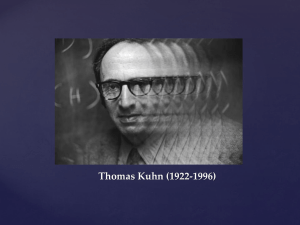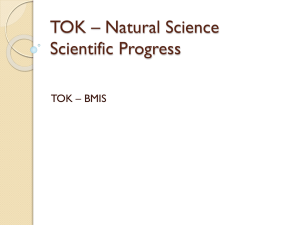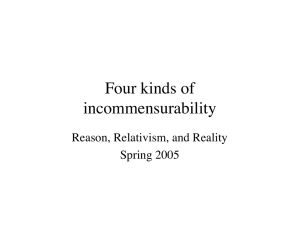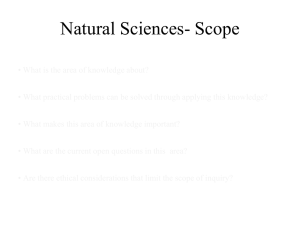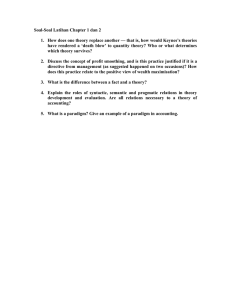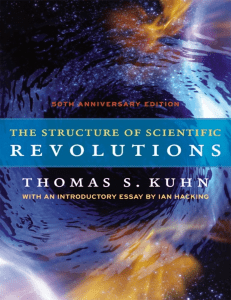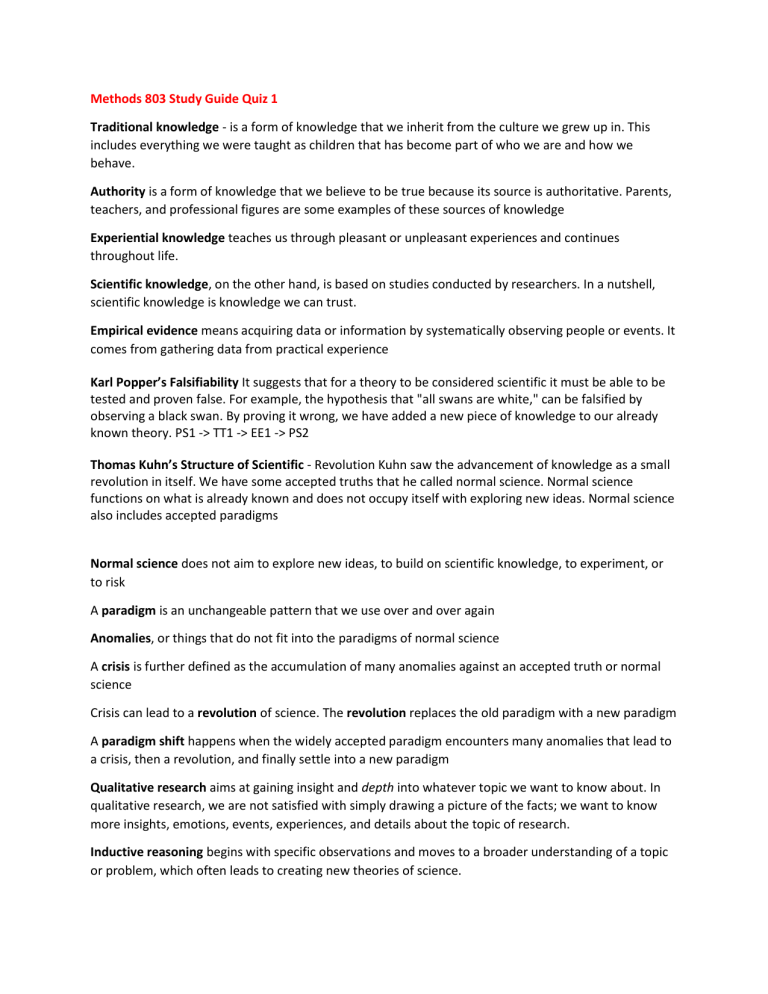
Methods 803 Study Guide Quiz 1 Traditional knowledge - is a form of knowledge that we inherit from the culture we grew up in. This includes everything we were taught as children that has become part of who we are and how we behave. Authority is a form of knowledge that we believe to be true because its source is authoritative. Parents, teachers, and professional figures are some examples of these sources of knowledge Experiential knowledge teaches us through pleasant or unpleasant experiences and continues throughout life. Scientific knowledge, on the other hand, is based on studies conducted by researchers. In a nutshell, scientific knowledge is knowledge we can trust. Empirical evidence means acquiring data or information by systematically observing people or events. It comes from gathering data from practical experience Karl Popper’s Falsifiability It suggests that for a theory to be considered scientific it must be able to be tested and proven false. For example, the hypothesis that "all swans are white," can be falsified by observing a black swan. By proving it wrong, we have added a new piece of knowledge to our already known theory. PS1 -> TT1 -> EE1 -> PS2 Thomas Kuhn’s Structure of Scientific - Revolution Kuhn saw the advancement of knowledge as a small revolution in itself. We have some accepted truths that he called normal science. Normal science functions on what is already known and does not occupy itself with exploring new ideas. Normal science also includes accepted paradigms Normal science does not aim to explore new ideas, to build on scientific knowledge, to experiment, or to risk A paradigm is an unchangeable pattern that we use over and over again Anomalies, or things that do not fit into the paradigms of normal science A crisis is further defined as the accumulation of many anomalies against an accepted truth or normal science Crisis can lead to a revolution of science. The revolution replaces the old paradigm with a new paradigm A paradigm shift happens when the widely accepted paradigm encounters many anomalies that lead to a crisis, then a revolution, and finally settle into a new paradigm Qualitative research aims at gaining insight and depth into whatever topic we want to know about. In qualitative research, we are not satisfied with simply drawing a picture of the facts; we want to know more insights, emotions, events, experiences, and details about the topic of research. Inductive reasoning begins with specific observations and moves to a broader understanding of a topic or problem, which often leads to creating new theories of science. Quantitative research starts with a lot of work up front, before the data are collected, and requires a good grasp of the topic of study and research conducted in that specific topic of interest. A quantitative researcher knows exactly what data are going to be analyzed, how the information will be collected, and even the types of procedures that will be used to analyze data Deductive reasoning begins with a broad theory that can lead to a specific idea or concept that is ready to be tested. The researchers decide how and what measures to use in order to test the idea Mixed methods refer to cutting-edge research studies that combine the best features of both qualitative and quantitative methodologies Ethics are a set of rules and regulations that are primarily concerned with protecting the rights of people who participate in research studies. One of the most important ethical rules is providing participants with information about the study, particularly about any risks that could be involved. Consider drug trials, for example. Pharmaceutical companies are eager to test new drugs on people. How else could they determine a drug’s effectiveness? However, the drugs could have adverse side effects. Participants must be informed about these potential risks before participating in the trial. If English is not their first language, they need to be informed about these risks in their own language. Conflict of interest, coercing and confidentiality. Violation of ethics - The Tuskegee syphilis study is an infamous case of an ethics violation in research. Between 1932 and 1972, the United States Public Health Service and the Tuskegee Institute conducted a study on the effects of syphilis on the human body. The researchers recruited 600 African American men to participate, but did not disclose the focus of their study to their participants, who were simply told they were being treated for “bad blood.” Many believed they were receiving free health services from the government. Objectivity means perceiving something from different angles without personal preferences or judgments Subjective thinking is based on personal emotions, experiences, and prejudices Selective observation happens when we are focused on a specific occurrence or a specific group of people instead of including an entire sample in our observation Overgeneralization happens when we use a small number of cases to draw conclusions about the entire population
